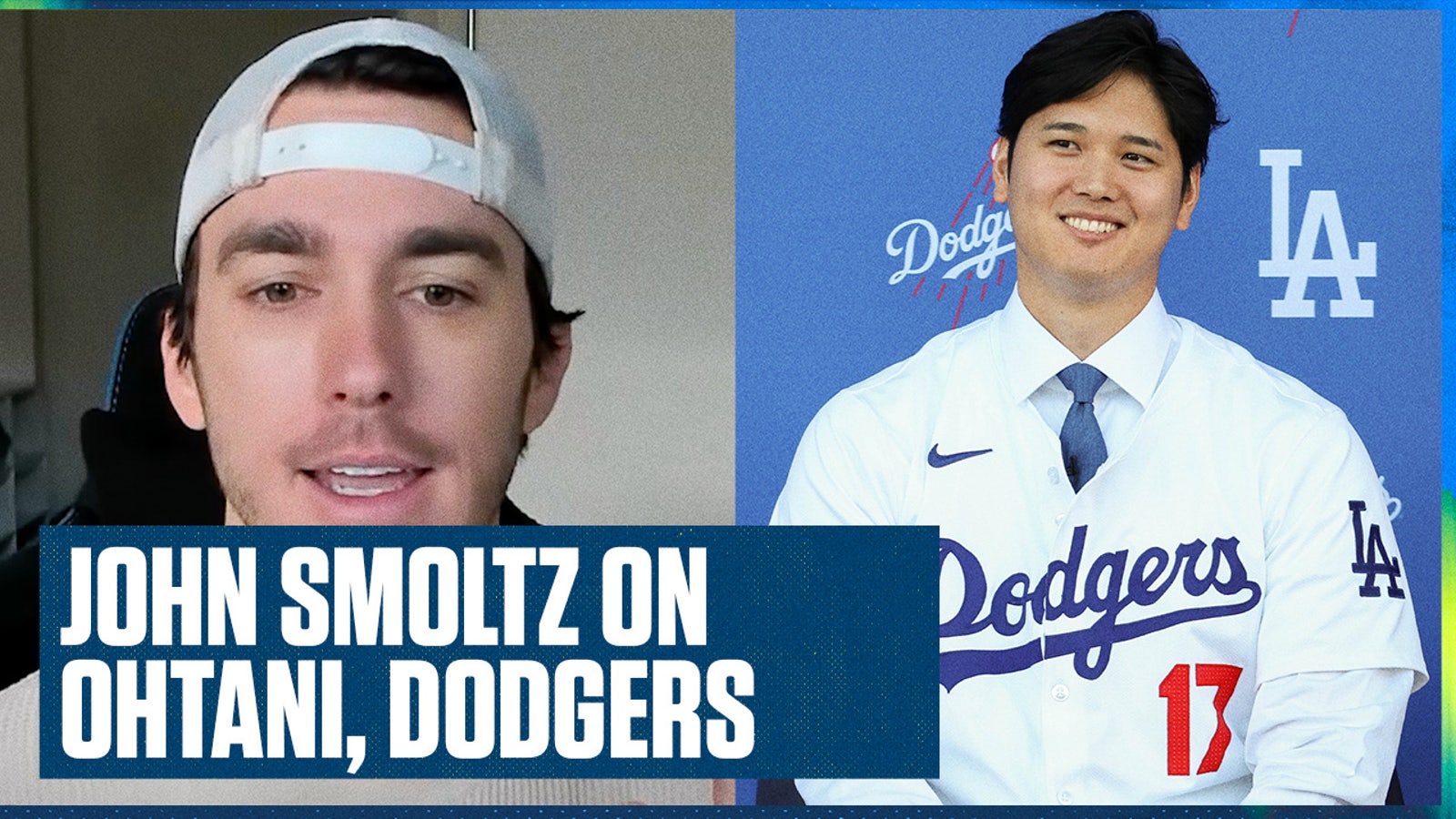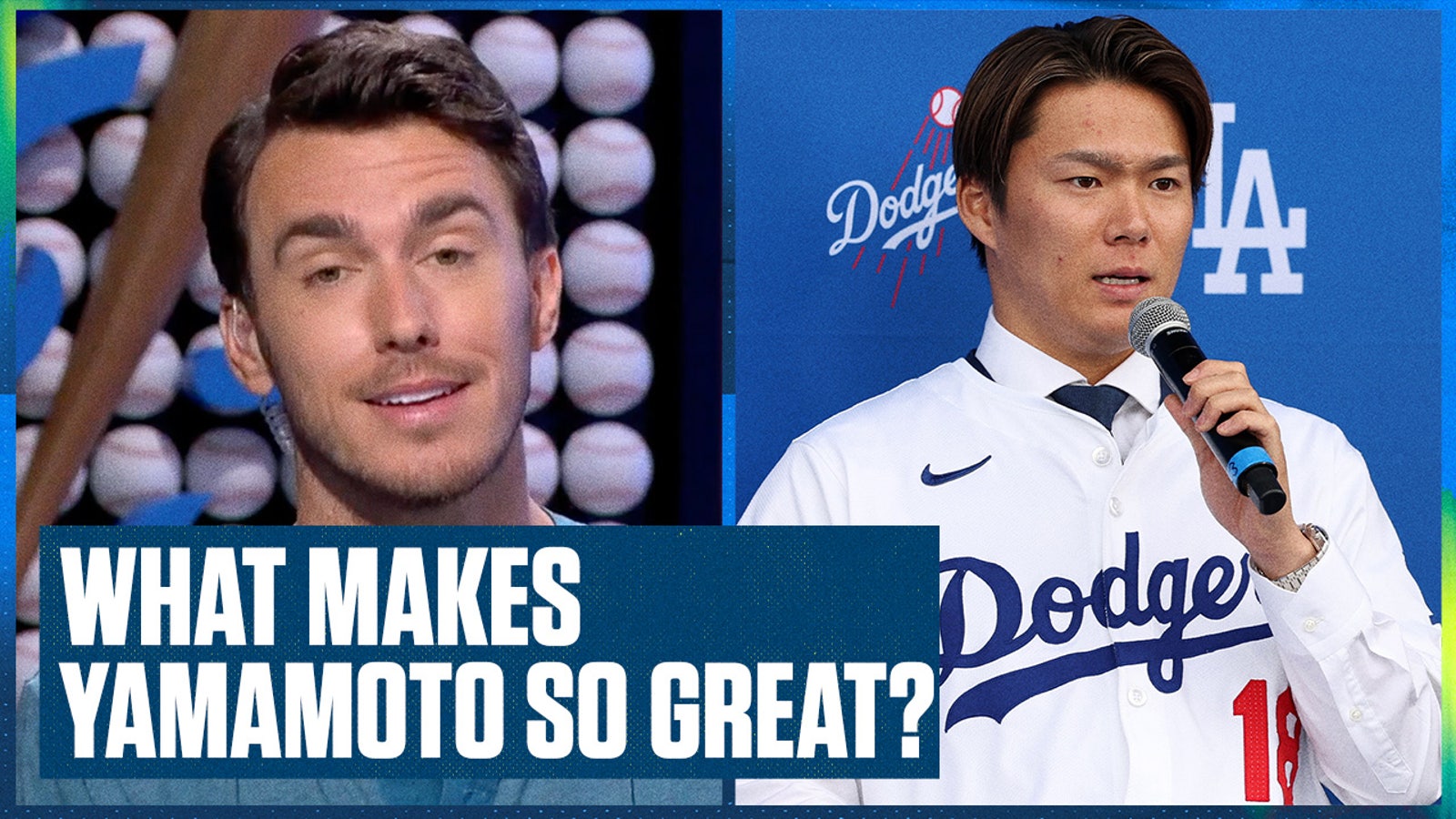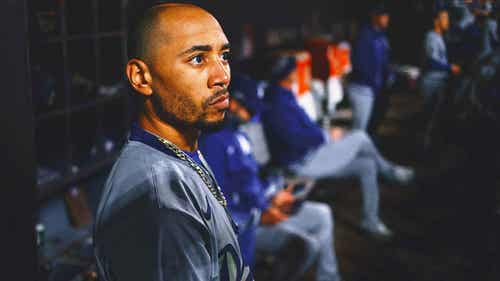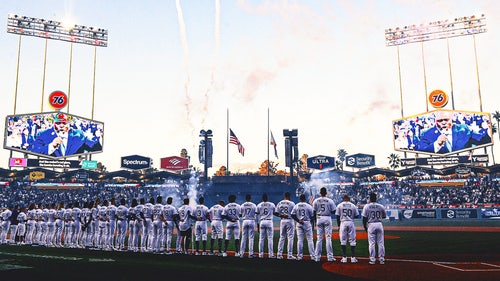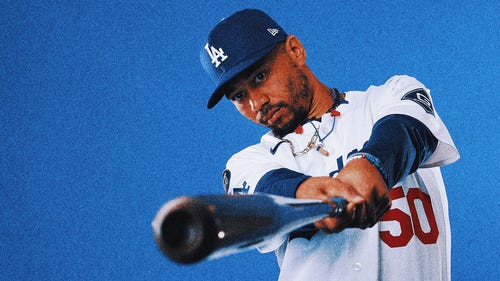
Ranking the 10 best MLB rookie seasons from Japanese starting pitchers
Major League Baseball is set to welcome two more pitching phenoms from Japan's Nippon Professional Baseball in 2024.
Yoshinobu Yamamoto was the top prize on the pitching market this offseason, signing a 12-year deal with the Dodgers in December that will pay him $325 million, the most ever for a pitcher. Shōta Imanaga, meanwhile, has reportedly agreed to a four-year deal for about $53 million with the Cubs.
The big question now surrounding both hurlers is, how well will their talent translate to the majors? As Yamamoto and Imanaga prepare to embark on the next chapter of their baseball careers, we dug into the numbers of Japanese starters who've transitioned from NPB to MLB.
Here's a list of the 10 best debut seasons among them.
10. Shohei Ohtani, Los Angeles Angels (2018)
- Final NPB season: 6 appearances, 5 starts, 3-2, 26.1 IP, 3.42 ERA, 31 K, 20 BB, 1.29 WHIP
- First MLB season (age 23): 10 starts, 4-2, 51.2 IP, 3.31 ERA, 63 K, 22 BB, 1.16 WHIP
While Ohtani can comfortably lay claim as the best Japanese player in MLB history, and arguably the most talented baseball player of all time, his rookie season in the majors provided fans with merely a glimpse of what he would do.
The two-way superstar had a solid debut campaign as a pitcher yet was interrupted by injuries on multiple occasions. He was placed on the injured list before the All-Star break with a UCL sprain in his throwing elbow. While he returned to hitting a month later, Ohtani didn't pitch again until September. A day after his return to the mound, Ohtani was shut down for good as it was determined he needed Tommy John surgery to repair his injured elbow. (But not before he'd also hit 22 homers and slashed .285/.361/.564 for a 151 OPS+.)
Ohtani has more than lived up to the expectations since then, winning two MVPs and registering three of the greatest single seasons ever recorded. Despite suffering another UCL tear this past summer, Ohtani signed the biggest deal in sports history this offseason, agreeing to a 10-year, $700 million deal with the Dodgers.
9. Masato Yoshii, New York Mets (1998)
- Final NPB season: 28 appearances, 26 starts, 174.1 IP, 13-6, 2.99 ERA, 104 K, 48 BB, 1.130 WHIP
- First MLB season (age 33): 29 starts, 6-8, 171.2 IP, 3.93 ERA, 117 K, 53 BB, 1.276 WHIP
After arriving to the majors at a relatively older age, Yoshii proved to be a reliable arm for the Mets as a rookie. The first two months of his debut season were particularly strong, launched by seven innings of scoreless ball in his MLB debut. That would prove to be the best start of his five-year career in the big leagues.
Moreover, Yoshii's rookie year was by far his best in the majors. He never recorded a sub-4.00 ERA again and his WHIP gradually rose.
8. Hisashi Iwakuma, Seattle Mariners (2012)
- Final NPB season: 19 games, 17 starts, 6-7, 126 IP, 2.43 ERA, 94 K, 21 BB, 1.10 WHIP
- First MLB season (age 31): 30 appearances, 16 starts, 9-5, 125.1 IP, 3.16 ERA, 101 K, 43 BB, 1.28 WHIP
Iwakuma got acclimated into the majors by beginning his career in the bullpen before moving into the rotation. He performed much better as a starter, going 8-4 with a 2.65 ERA over 16 outings to close out the season. He earned a two-year deal from the Mariners that offseason as a result, and was named an All-Star a year later. Iwakuma pitched six MLB seasons before being demoted to the minors and later returning to Japan.
7. Hiroki Kuroda, Los Angeles Dodgers (2008)
- Final NPB season: 26 starts, 12-8, 179.2 IP, 3.56 ERA, 123 K, 42 BB, 1.21 WHIP
- First MLB season (age 33): 31 starts, 9-10, 183.1 IP, 3.73 ERA, 116 K, 42 BB, 1.22 WHIP
After flirting with the prospect of departing for MLB for over a year, Kurdoa signed a three-year, $35.3 million contract with the Dodgers ahead of the 2008 season. He was uneven through much of the first half of his rookie year, delivering some solid outings but throwing a couple of duds while going 3–6 with a 4.04 ERA before missing a month to injury.
Kuroda rebounded upon his return, posting a 3.48 ERA in his final 17 starts. He also allowed just two runs in two postseason starts over 12.1 innings, earning the win in both outings to help the Dodgers reach the National League Championship Series. His strong second half was good enough for him to be the club's Opening Day starter in 2009.
6. Daisuke Matsuzaka, Boston Red Sox (2007)
- Final NPB season: 25 starts, 17-5, 186.1 IP, 2.13 ERA, 200 K, 34 BB, 0.92 WHIP
- First MLB season (age 26): 32 starts, 15-12, 204.2 IP, 4.40 ERA, 201 K, 80 BB, 1.32 WHIP
Matsuzaka was one of the more accomplished pitchers to come from Japan when he arrived in Boston as a 26-year-old ahead of the 2007 season. After the Red Sox won the bidding rights to sign Matsuzaka with a $51.1 million fee, they signed him to a six-year, $52 million deal.
Matsuzaka pitched well out of the gates, striking out 10 hitters and giving up one run in his MLB debut. He hit some turbulence later in the spring and again later in the season, but he pitched well in the middle of the season, recording a 3.21 ERA over June and August. He struggled in his first two postseason starts, but pitched five innings of two-run ball in Game 7 of the ALCS, picking up the win. He gave up two runs over 5.1 innings in his lone World Series start versus the Rockies, picking up the win while recording a two-RBI single. He's the only pitcher on this list to win a World Series in his rookie year and finished fourth in American League Rookie of the Year voting.
A year later, Matsuzaka had a career year, going 18-3 with a 2.90 ERA to finish fourth in the AL Cy Young race. But he mostly struggled thereafter, underwent Tommy John in 2011 and returned to Japan in 2015 after eight seasons. Oh, and he never threw the mythical gyroball in an MLB game.
5. Kenta Maeda, Los Angeles Dodgers (2016)
- Final NPB season: 29 starts, 15-8, 206.1 IP, 2.09 ERA, 175 K, 41 BB, 1.01 WHIP
- First MLB season (age 28): 32 starts, 16-11, 175.2 IP, 3.48 ERA, 179 K, 50 BB, 1.14 WHIP
Maeda joined the Dodgers as they geared up to try to take the next step and contend for a World Series in 2016. The righty proved to be worth the eight-year, $25 million contract plus a $20 million posting fee relatively quickly. Not only did he pitch six innings of scoreless ball in his first career start, Maeda also hit a home run in his second career at-bat.
He was mostly stellar throughout his rookie year, finishing third in NL Rookie of the Year voting as a result and helping the Dodgers get to the postseason. However, he struggled in all three playoff starts he made, causing the Dodgers to fall in six games to the Cubs in the NLCS.
Following a successful debut season, Maeda continued to be a reliable arm for the Dodgers, though he moved to the bullpen for Los Angeles' World Series' runs in 2017 and 2018. He was eventually traded to the Twins in 2020 as part of the fallout from the Mookie Betts trade and was the AL Cy Young runner-up during the abbreviated season. He signed with the Tigers this offseason.
4. Yu Darvish, Texas Rangers (2012)
- Final NPB season: 28 starts, 18-6, 232 IP, 1.44 ERA, 276 K, 36 BB, 0.83 WHIP
- First MLB season (age 25): 29 starts, 16-9, 191.1 IP, 3.90 ERA, 221 K, 89 BB, 1.28 WHIP
Darvish arrived in the United States with similar fanfare as Matsuzaka did five years prior. The Rangers posted a similar posting bid ($51.7 million) and gave Darvish a similar contract (six years, $60 million) as the Red Sox did Matsuzaka.
Darvish, though, was slightly better as a rookie. After giving up five runs in his first MLB start, Darvish settled in and went 4-0 with a 2.18 ERA that April, winning AL Rookie of the Month as a result. He continued to pitch at a high level for much of that first season, earning an All-Star nod in the process. He also finished third in AL Rookie of the Year voting and ninth in the Cy Young race.
The 2012 season was just the first of many strong seasons for Darvish in the big leagues. He proved to be one of the game's better pitchers over the next decade, earning four more All-Star nods and multiple second-place Cy Young finishes, even after undergoing Tommy John surgery in 2015.
3. Masahiro Tanaka, New York Yankees (2014)
- Final NPB season: 27 starts, 24-0, 212 IP, 1.27 ERA, 183 K, 32 BB, 0.94 WHIP
- First MLB season (age 25): 20 starts, 13-5, 136.1 IP, 2.77 ERA, 141 K, 21 BB, 1.06 WHIP
The Yankees have also featured a star Japanese pitcher smoothly acclimating himself to the big leagues within the past decade. Tanaka initially appeared to be worth every penny of the seven-year, $155 million contract he received upon his transfer, pitching at least six innings in each of his first 18 outings and recording a quality start in the first 16.
Tanaka earned an All-Star nod for his work, though an elbow injury sidelined him for over two months. It was believed he was going to need Tommy John surgery, but Tanaka opted to receive a PRP shot instead and finished fifth in the AL Rookie of the Year race. He'd post an even better season in 2016 (14-4, 3.07 ERA) and place seventh in AL Cy Young voting, but he became gradually less effective over the next four seasons and returned to Japan in 2021 at just 32 years old.
2. Kodai Senga, New York Mets (2023)
- Final NPB season: 23 appearances, 22 starts, 11-6, 148 IP, 2.25 ERA, 159 K, 50 BB, 1.04 WHIP
- First MLB season (age 30): 29 starts, 12-7, 166.1 IP, 2.98 ERA, 202 K, 77 BB, 1.22 WHIP
The most recent Japanese star pitcher to debut in the majors is coming off a memorable rookie season. Senga, who signed a five-year, $75 million deal with the Mets ahead of the 2023 campaign, scuffled a bit in his first month but settled in soon after. He struck out 12 against a formidable Rays lineup last May en route to recording a 2.64 ERA over his final 22 starts.
The crafty righty made the All-Star team in July after posting a better first half than future Hall of Fame teammates Max Scherzer and Justin Verlander. Senga finished second in NL Rookie of the Year voting, seventh in NL Cy Young, and became the first Mets rookie to record 200 strikeouts in a season since Dwight Gooden in 1984.
1. Hideo Nomo, Los Angeles Dodgers (1995)
- Final NPB season: 17 starts, 8-7, 114 IP, 3.63 ERA, 126 K, 86 BB, 1.60 WHIP
- First MLB season (age 26): 28 starts, 13-6, 191.1 IP, 2.54 ERA, 236 K, 78 BB, 1.06 WHIP
Nomo's path to reach the majors was well worth the trouble he endured and ultimately blazed a trail for everyone on this list. Just over 30 years after Masanori Murakami became the first Japanese pitcher to pitch in MLB, Nomo decided he wanted to be the second ahead of the 1995 season, with his agent invoking the "voluntary retirement clause" in order to get him to the United States.
Soon after signing a contract with the Dodgers that included a $2 million signing bonus, Nomo dominated MLB hitters upon the end of the players' strike. His unusual delivery helped him become the league leader in strikeouts as a rookie, his 11.1 strikeouts per nine innings shattering Sandy Koufax's single-season franchise record. That figure topped the National League, while his 5.8 hits per nine innings led the majors. Nomo started the All-Star game for the National League that year and finished fourth in NL Cy Young voting.
The magnificent rookie season proved to be the peak of his career, though he finished fourth in Cy Young voting in 1996, as well, and enjoyed several solid campaigns during a 12-year career. Nomo became just the second pitcher in MLB history to record at least 200 strikeouts in each of his first three seasons. He also pitched a pair of no-hitters, including the first (and still the only) no-hitter in Coors Field history in 1996.
UP NEXT
Yoshinobu Yamamoto, Los Angeles Dodgers (age 25)
- Final NPB season: 24 starts, 17-6, 171 innings pitched, 1.16 ERA, 176 strikeouts to 28 walks, 0.860 WHIP
Of all the Japanese phenoms to pitch in the majors, none have received more hype upon their arrival than Yamamoto. He'd been touted as a potential MLB ace well before he signed the lengthiest and most lucrative pitching contract in history last month. Look no further than his three consecutive MVPs, Sawamura awards (NPB's Cy Young equivalent) and pitching triple crowns for why.
Shōta Imanaga, Chicago Cubs (age 30)
- Final NPB season: 24 starts, 7-5, 159 innings pitched, 2.66 ERA, 188 strikeouts to 24 walks, 1.019 WHIP
Imanaga won't begin his MLB career with as much fanfare as Yamamoto, but it's easy to see why the Cubs are giving him a nice payday. The southpaw has been one of the best pitchers in NPB over the past few years, as well, earning a pair of All-Star nods and throwing a no-hitter. The Cubs likely hope their new hurler can have a similar impact as Senga did for the Mets last year.

